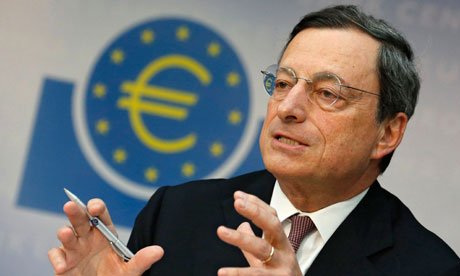
European Central Bank’s president, Mario Draghi, has unveiled details of a new bond-buying plan aimed at easing the eurozone’s debt crisis.
Mario Draghi said the scheme would provide a “fully effective backstop” and that the euro was “irreversible”.
The ECB aims to cut the borrowing costs of debt-burdened eurozone members by buying their bonds.
Ahead of the announcement, the central bank kept the benchmark eurozone interest rate unchanged at 0.75%.
Mario Draghi said the ECB would engage in outright monetary transactions (OMTs) to address “severe distortions” in government bond markets based on “unfounded fears”.
He insisted that the ECB was “strictly within our mandate” of maintaining financial stability, but reiterated the need for governments to continue with their deficit reduction plans and labor market reforms.
He added that the ECB’s actions came in response to eurozone economic contraction in 2012, with continued weakness likely to continue into 2013.
The ECB expects the eurozone economy to shrink by 0.4% in 2012 and grow by 0.5% in 2013, with inflation rising to 2.6%.

OMTs will only be carried out in conjunction with European Financial Stability Facility or European Stability Mechanism programmes, he said.
In other words, countries will still have to request a bailout before the OMTs are triggered.
The maturities of the bonds being purchased would be between one and three years and there would be no limits on the size of bond purchases, he added.
The ECB will ask the International Monetary Fund to help it monitor country compliance with its conditions.
Responding to the plans, Peter Westaway, chief economist for Europe at asset manager Vanguard, said: “This is just the good news that was priced by the markets, and it has now been confirmed.
“There is a long-term question of whether this will be enough to meet the long-term financing needs of Italy, and that probably remains.”
European stock markets reacted positively to the announcement, with the FTSE 100 surging 2.1%; the German Dax, 2.91%; the French Cac 40 index, 3.06%; and the Spanish IBEX, 4.91% at the close.
Bank shares in particular rose sharply on the news, with French banks Credit Agricole and Societe Generale up 8.44% and 7.76% respectively, while in Germany, Deutsche Bank rose 7.06% and Commerzbank, 5.25%. In London, Lloyds Banking Group rose 6.69%.
However, the euro fell back against the dollar to $1.2571 following its high of $1.265 reached before the ECB announcement.
While Mario Draghi was announcing the ECB’s plans, German Chancellor Angela Merkel was meeting Spanish Prime Minister Mariano Rajoy for talks on the eurozone crisis.
In a joint news conference afterwards, Angela Merkel said: “We have to restore confidence in the euro as a whole, so that the international markets have confidence that member countries will fulfil their commitments.”
Mariano Rajoy said: “We want to dispel any doubts on the markets about the continuity of the euro.”
Jens Weidmann, president of Germany’s Bundesbank, remains vigorously opposed to the ECB’s plan, concerned that member states could become hooked on central bank aid and failed to reform their economies sufficiently.
But the majority of the 23 ECB council members support the plan.
And the Organization for Economic Co-operation and Development (OECD) added its support for the ECB bond-buying plan on Thursday, as it warned that the eurozone crisis posed the greatest risk to the global economy.
It is calling for more action from central banks to prevent a break-up of the eurozone.
“Concerns about the possibility of exit from the euro area are pushing up [government bond] yields, which in turn reinforces break-up fears,” the OECD said in its global economic outlook.
“It is crucial to stem these exit fears. This could be achieved by the ECB undertaking bond market intervention to keep spreads within ranges justified by fundamentals.”
Mario Draghi is hoping that ECB intervention in the bond markets will help reduce the borrowing costs of debt-laden countries such as Spain and Italy and lessen the likelihood of them needing to ask for a full sovereign bailout, an eventuality that could bankrupt the eurozone and cause the collapse of the euro.
Spain, which has already asked for 100 billion euros in state aid to help its debt-stricken banks, is currently paying yields of 6.42% on its 10-year bonds, while Italy’s 10-year bond yields are 5.51%, below the critical 7% figure thought likely to trigger a sovereign bailout request.
Outright Monetary Transactions (OMTs)
The term used for the European Central Bank’s programme of buying government bonds with maturities of between one and three years with the aim of reducing a specific country’s borrowing costs. OMTs are only triggered if a country has applied to the European Financial Stability Facility or European Stability Mechanism for financial assistance and are conditional on a government putting in place financial reforms approved by eurozone financial authorities and monitored by the International Monetary Fund.